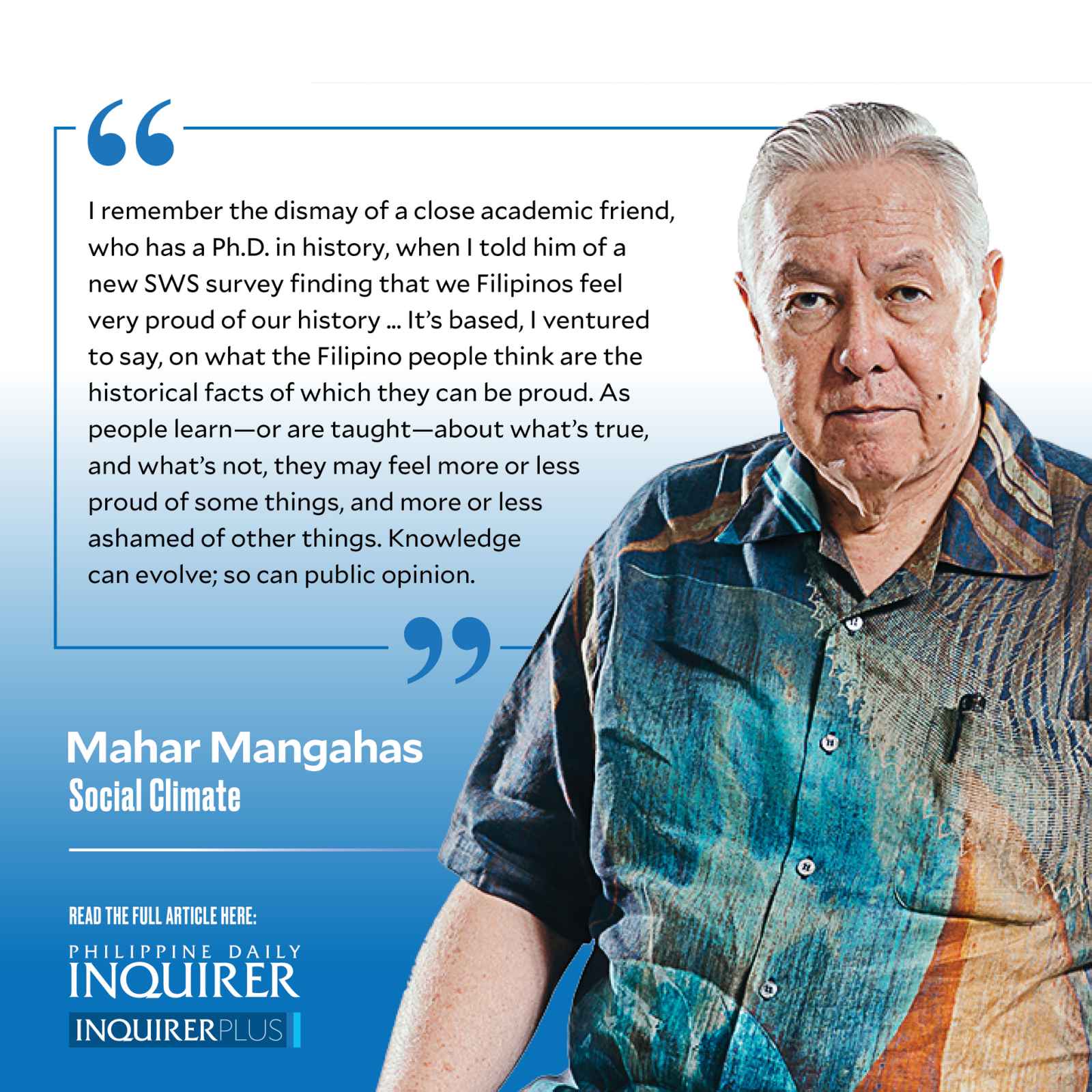Social memory is dynamic

I remember the dismay of a close academic friend, who has a Ph.D. in history, when I told him of a new SWS survey finding that we Filipinos feel very proud of our history. “How can that be,” he exclaimed, “when we hardly know our history? Don’t you know how bad our Philippine history textbooks are?”
It’s based, I ventured to say, on what the Filipino people think are the historical facts of which they can be proud. As people learn—or are taught—about what’s true, and what’s not, they may feel more or less proud of some things, and more or less ashamed of other things. Knowledge can evolve; so can public opinion.
I was already 22 when I understood, from Nick Joaquin’s “A Question of Heroes,” how Dewey fooled Aguinaldo about the United States’ intentions for the Philippines. I was over 35 when I learned from an academic paper that Aguinaldo garnered a low-priced 1,000-hectare estate out of the friar lands purchase. (Was Aguinaldo the only one accommodated?)
That deal was one of the tactics for ending what was then called an “insurgency,” and is now rightly called the Philippine-American War. The American Occupation was from Aug. 13, 1898, when US troops entered Intramuros, to noon of July 4, 1946. Aug. 13, called Occupation Day, was an official non-working holiday.
The American Occupation was the period between the Spanish Occupation—dated not from 1521 with Magellan, but from 1571 when Spanish Manila was founded—and the Japanese Occupation of May 8, 1942 to July 5, 1945 (Wikipedia: presumably marking the entry and exit of the Japanese forces to/from Manila).
And let us not forget the British Occupation of Manila, from October 1762 to April 1764, which ended, if I’m not mistaken, with Spain agreeing to give up Florida to Britain in exchange for the return of the Philippines. Not a bad deal for Britain.
That adds up to four occupations by four imperial powers. One of them—the American one—was a double occupation of the Spanish and the Moro areas of the Philippines, the latter being the prize of the Moro-American War.
President Duterte, early on, tried to stoke resentments of the double US occupation by calling attention to the Balangiga massacre in Samar (1901) and the Bud Dajo massacre in Jolo (1906). Of course, he failed to erase people’s memories of Bataan/Corregidor (1942) and of Douglas “I shall return” MacArthur (1945).
SWS surveys show that Filipinos presently trust Britain, Spain, Japan, and especially the US, but strongly distrust China, even though the (failed) invasion of the warlord Limahong was half a millennium ago (1574). With the US regime came fresh perspectives of non-Catholic Christianity and non-Spanish Catholicism.
Who do present Filipinos think are the heroes and villains of the Jabidah massacre (1968), the Plaza Miranda bombing (1971), the declaration of martial law (1972), the burning of Jolo (1974), the Ninoy Aquino assassination (1983), the Edsa People Power Revolution (1986), the Mendiola massacre (1987), the military coup attempts (1987, 1989), Edsa People Power II (2001), the Maguindanao massacre (2009), the Mamasapano clash (2015), the ruling of the Arbitral Tribunal on the Law of the Sea (2016), and the Battle for Marawi (2017)? What do they see as the triumphs and the tragedies in these events?
It’s not necessary to have been personally present in the above events to have a memory of them. Seniors impart their experiences to juniors. Teachers are duty-bound to tell their students the truth. There are textbooks that cover martial law, fully and fairly. History professors Fe Buenaventura-Mangahas and Milagros Guerrero are collaborating on more books.
There are clan memories, family memories, and personal memories, oral and written. I have books authored by Ferdinand Marcos. I know his handwriting when I see it. I also know what to do with what he authored and what he wrote.
——————
Contact: mahar.mangahas@sws.org.ph




















